| Srl | Item |
| 1 |
ID:
173375


|
|
|
|
|
| Summary/Abstract |
Despite the truism that less is known about the deep-sea than outer space, deep-sea mining (DSM) is being promoted as the next frontier of resource extraction. In 2019, Nautilus Minerals hopes to become the world’s first company to mine the deep seabed in the waters off Papua New Guinea (PNG). DSM thus stands at the threshold of becoming a matter of politics; it has provoked a wide range of geopolitical imaginaries variously relating to ‘resource security’ and ‘progress’, on the one hand, and environmental disaster and precaution on the other. However, these accounts do little to address the specific ‘nature’ of the deep-sea, seabed and their extreme location and materialities, and are instead framed by classic geopolitical concerns with interstate relations. Against this background and illustrated by examples centred on PNG, this paper argues that future engagements with the geopolitics of DSM are more accurately conceptualised by an engagement with time as well as three dimensional space. This includes the multiple spatial and temporal registers through which both the geology and ecologies of seabed and seawater operate. By highlighting the importance of resource temporalities, it suggests that the geopolitics of both DSM and extraction in extreme places more generally is not only spatially complex, it is also a matter of time.
|
|
|
|
|
|
|
|
|
|
|
|
|
|
|
|
| 2 |
ID:
152080


|
|
|
|
|
| Summary/Abstract |
Recently there have been increasing instances of the return of the state as the central agent of development in resource-rich nations globally. Characterised by both a rhetorical and substantive commitment to increasing control over national resource revenues, this so-called new/neo-extractivism has attracted a debate concerning the extent to which it offers a viable alternative to the imperatives of neoliberal resource extraction. Using two examples, this paper analyses the ways in which the Ghanaian and Ecuadorean states discursively imagine such structural transformations. It highlights the value in analysing the politics of language for strengthening studies of neo-extractivism.
|
|
|
|
|
|
|
|
|
|
|
|
|
|
|
|